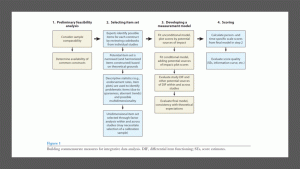IDA is a methodology (rather than a single analysis) for the simultaneous analysis of raw data pooled from multiple studies. The method may be used to examine novel questions in participant-level data (rather than summary statistics from separate studies) and may accomodate some degree of measurement differences across pooled studies. The method describes a multi-staged approach to addressing issues within any pooled data application for item-level harmonization, psychometric analyses to create commensurate measures across studies, testing hypotheses with pooled data, and examining reproducibility or study differences.
| What are potential advantages of pooled data analysis? | What are unique features of IDA? | What makes IDA different than traditional Meta-Analysis? |
|---|---|---|
| Larger sample sizes & increased statistical power | Pooling at the individual participant rather than pooled study level of analysis | Analysis of individual participant data rather than summary statistics |
| Greater sample heterogeneity to test generalizability | Use of psychometric models for scoring | Designed to answer novel questions not addressed in prior analyses |
| Ability to test cross-study replication and reproducibility | Consideration of study differences in hypothesis testing | Greater power for studying individual differences |

